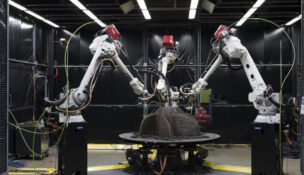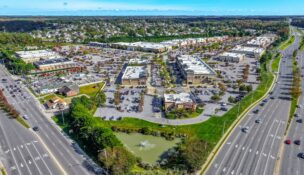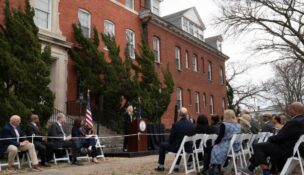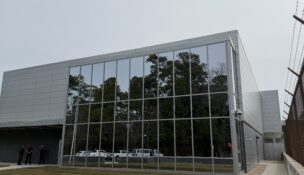The real world
Experiential learning helps business students link classroom, workplace
Jason Roop //December 30, 2019//
The real world
Experiential learning helps business students link classroom, workplace
Jason Roop //December 30, 2019//
When a new brewery set its sights on the Williamsburg area, it knew William & Mary students would be a key customer base.
To reach them, the business owners decided to tap into a source of unique marketing advice — Agency 1693, an advertising firm run by William & Mary students.
“We offer premium content,” says agency President Erika Marr, a senior business student, “but at a much different price from what a company advertising agency would.”
Clients pay for Agency 1693’s services, and students earn paychecks. This is no unpaid internship, and there’s no college credit. Instead, Agency 1693 is a for-profit, university-sanctioned independent venture formed about three years ago. Students run the show, says its adviser, Jeffrey Rich, William & Mary’s chief marketing officer.
They’ve worked on projects for nonprofits, private companies and on-campus clients, with services such as creating videos, designing logos and devising marketing strategies. The agency won an award for a suicide prevention public-service campaign that ran in Pennsylvania.
In marketing classes, Marr learns conceptual ideas, strategies to target audiences and how to understand the wants and needs of consumers. “But getting real-world experience is really hard on campus,” she says. “This is a perfect way to not jump right into an internship but get your hands on projects — even if you have a busy semester.”
With those projects come responsibility, pressure, client feedback and real-world creative jobs with real consequences.
All of that equates to a unique, hands-on learning environment. The concept, referred to as experiential education, stretches back decades. But business schools across Virginia are embracing it in new ways.
That’s because they realize it’s powerful learning, says Janet Eyler, professor emerita in the practice of education at Vanderbilt University, who studied and has written about experiential education.
“The challenge of education is what we call transfer of learning,” Eyler says. You learn concepts in a classroom, but “people often don’t recognize when they are useful in the community or … business, or know when to apply them.”
Students begin to connect the dots when they’re able to perform real work that makes a difference for real people, she says: “That edge of experiential education is when you learn in context, you understand the subject matter in a more complex and deep way that makes it more useful.”
Not Monopoly money
Context is about to come to life in a serious way for students at the Pamplin College of Business at Virginia Tech, which has launched a program called Credit Corps in partnership with Richmond-based Atlantic Union Bank.
The program allows students to work as commercial loan officers after receiving certification from the Risk Management Association.
The Virginia Tech Foundation has committed $500,000 a year to Credit Corps for the next four years, an investment it hopes will pay off both as an educational experience and in the form of returns on those loans.
“The students will be making those decisions, whether or not to make the loans,” says George Morgan, who holds an endowed finance professorship at Virginia Tech.
Morgan, who helped develop the program, saw things kick off for students in the fall semester with their first deal team. Those students have researched their first loan candidate, visited the company and hope to close on the deal by the beginning of the spring semester.
Morgan has seen the difference such experiences can make as a longtime faculty adviser for BASIS, a student-managed investment group. It offers Tech students across the university the opportunity to have a say in how $5 million of the foundation’s endowment is invested in the bond markets.
“When real money is involved,” Morgan says, “it’s taken quite a bit differently by the students. So they take it much more seriously, they take it as much more responsibility, that they have to make the right decisions.”
Because of the risks and regulatory compliance issues, some banks were reluctant to partner with Credit Corps. Getting involved also requires bank employees to serve as liaisons to the student group and iron out logistics.
“It’s not for every bank,” Morgan says. But as a large regional bank, Atlantic Union was a great fit. It’s offering its time and expertise and provides educational workshops for students.
“We’re trying to build very much in that direction of experiential learning,” he says of Virginia Tech’s efforts. “To us, it means getting real job experience in the curriculum here, within the university.”
The goal is to give world-class job experience to students before they graduate. “In many ways,” he says, “what comes out of our undergraduate programs are people who look a lot more like graduate students.”
Client service
Graduate schools of business often deal with students who already are working in their career fields. Even so, the schools are trying novel approaches that go beyond group projects and classroom lectures.
On a late afternoon in early December, nine graduate students wrapped up an important day at Virginia Commonwealth University’s business school.
They spent the fall semester studying international business opportunities for SingleStone, a Glen Allen-based technology consulting company serving clients from the insurance and financial industries.
“I think SingleStone was very pleased with what we did,” says Van R. Wood, the students’ marketing professor.
Wood serves as director of the VCU School of Business’ Center for International Business Advancement and holds the Philip Morris Endowed Chair in International Business. He’s shepherded 25 of these projects for a state program called VITAL — the Virginia International Trade Alliance.
Then-Gov. Terry McAuliffe started the initiative in 2016, Wood says, to train the next generation of savvy, international marketers while helping Virginia companies export more products. To help make that happen, VCU partners with the international trade division of the Virginia Economic Development Partnership.
Wood starts his semester looking for companies that have an interesting product or service and are doing well domestically but haven’t considered international sales. If the company fits with VEDP’s plan, he secures its involvement.
His students, once trained, meet with clients, learn about their products and services, and then go to work analyzing international markets.
“We typically start with every country in the world,” he says, finally narrowing the target group to the top three or five. Students show the company how they might be successful in those markets — as a free service. Students prepare international market analysis, marketing plans and strategic alliances.
“Initially, they’re a little intimidated,” Wood says, but their recommendations have real-world influence. “And that’s what experiential learning is all about.”
Making small talk
Not everything in the business world is learned in a classroom — or comes as naturally as students might imagine.
Something as simple as knowing how to dine in a business setting, for example, is an avenue for learning in a program offered by the Robins School of Business at the University of Richmond.
The program, called Q-Camp, is a two-day series of workshops and interactive seminars designed to give students experience in networking, business skills, professional brand building — and the proper way to eat soup.
University of Richmond senior Alex Kohnert recalls her experience as a sophomore at Q-Camp, which included a three-hour etiquette dinner. Students learned about manners and the art of small talk — something not everyone develops growing up.
One of the biggest takeaways, Kohnert says, may seem almost silly — composing a professional email. “It sounds so simple,” she says, especially for a generation accustomed to texting and using technology. But the basics of communication in a business setting can look a lot different than a quick text to a friend.
The workshop also helped her gain insights into her personality style and those of others, she says — and how to best communicate with them.
“I just think you get such a different perspective on what’s going to come next,” Kohnert says, creating a better understanding of the interpersonal dynamics of group projects, or what the real world may bring.
The experience also helped her make the most of a summer internship in New York at UBS Wealth Management, which required her to network and adapt to unfamiliar situations.
A crucial element of experiential education, what brings the subject matter to life, is going back and forth between conceptual learning and hands-on work and community service, Eyler says.
“It’s the reflective process that links the two,” she says. “Doing real work is important. But the critical thing, if you’re talking about learning stuff, is explicitly linking the things you’re learning in the field.”


















